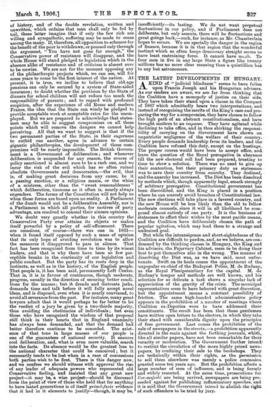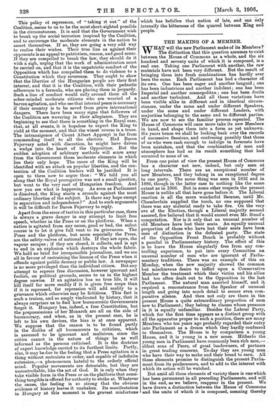1.11.6 LATEST DEVELOPMENTS IN HUNGARY..
A' "judicial blindness" seems to have fallen upon of Joseph and his Hungarian advisers. As our readers are aware, we are far from thinking that the Coalition have a monopoly of justice on their side. They have taken their stand upon a clause in the Compact of 1867 which admittedly bears two interpretations, and instead of recognising the merits of the King's case and pre- paring the way for a compromise, they have chosen to follow the high path of an abstract constitutionalism, and. have brought matters to an impasse. They have agitated while declining to take office, and in thus shirking the responsi- bility of carrying on the Government have shown an unpatriotic negligence of the welfare of their country.. Every people demands leadership from its leaders, and the Coalition have refused this duty, except on the hustings. The proper course would have been to accept office, and . leave the question of the Royal prerogative in abeyance till the new electoral roll had been prepared, trusting to time to show a solution. There was no need to give up their contention, but their primary duty as statesmen. was to save their country from anarchy. They declined, and the anarchy has increased. The Diet has been dissolved by methods which, though apparently legal, smack strongly of arbitrary prerogative. Constitutional government has been discredited, and the King is placed in a position where he can scarcely avoid breaches of Constitutional law. The new elections will take place in a fevered. country, and the new House will be less likely than the old to follow. moderate counsels, since it will in all likelihood be com- posed almost entirely of one party. It is the business of statesmen to effect their wishes by the most pacific means, and the Coalition have deliberately chosen the path of popular agitation, which may lead, them to a strange and. undesired goal.
But while the intransigence and short-sightedness of the Coalition are difficult to pardon, and, as we believe, are con- demned by the thinking classes in Hungary, the King and his advisers, the Fejervary Cabinet, seem to be doing their best to put themselves also in the wrong. The manner of dissolving the Diet was, as we have said, most unfor- tunate. Swift on its heels comes the appointment of the unpopular ex-chief of the Budapest Police, M. de Rudnay, as the Royal Plenipotentiary for the capital. M. de Rudnay's temper and methods are well known, and his selection for so delicate a task shows a singular lack of appreciation of the gravity of the crisis. The municipal representatives seem to have behaved. with great discretion, but the appointment means a constant possibility of friction. The same high-handed administrative policy appears in the prohibition of a number of meetings where Coalition ex-Deputies were to have addressed their constituents. The result has been that these gentlemen have written open letters to the electors, in which they take their stand with considerable dignity upon the principles of free government. Last comes the prohibition of the sale of newspapers in the streets,—a prohibition apparently directed in the main against the farthing journals, which, like all similar papers, have not been remarkable for their veracity or moderation. The Government further intend.' to restrict the circulation of the more highly priced news- papers, by confining their sale to the bookshops. They are technically within their rights, as the permission to sell them elsewhere was merely a police concession granted some ten years ago. But the prohibition affects a large number of men of influence, and is being fiercely and widely resented. At the same time, prosecutions for lese-majestg are being revived, newspapers are being pro- ceeded against for publishing inflammatory speeches, and it is said that the Government intend to abolish the right of such offenders to be tried by jury. This policy ot repression, of "taking it out" of the Coalition, seems to us to be the most short-sighted possible in the circumstances. It is said that the Government wish to break up the social terrorism inspired by the Coalition, and to encourage the moderate elements in the nation to assert themselves. If so, they are going a very odd way to realise their wishes. Their true line as against their opponents is an appeal to patriotism, reason, and good sense. IT they are compelled to break the law, they should do it with a sigh, urging that the work of administration must be carried on, and that it is the unpatriotic conduct of the Opposition which has compelled them to do violence to a Constitution which they reverence. They ought to show that the liberties of the Hungarian people are their first interest, and that it is the Coalition, with their pedantic adherence to a formula, who are placing them in jeopardy. Such a line of conduct would rally around them all the sober-minded moderate citizens who are wearied of a barren agitation, and who see that internal peace is necessary if their country is to be saved from grave international dangers. There have been many signs that followers of the Coalition are wavering in their allegiance. They are beginning to see that there is something in the Royal case, that, at all events, it is hopeless to expect the King to yield at the moment, and that the wisest course is a truce. The intransigence of Count Albert Apponyi is far from commending itself, to all the electors. Had Baron Fejervary acted with discretion, he might have driven a, wedge into the heart of the Opposition. But the sudden adoption of arbitrary methods will scare away from the Government those moderate elements in which lies their only hope. The cause of the King will be identified with an attack on popular liberties, and the con- tention of the Coalition leaders will be justified. It is open to 'them now to argue thus : "We told you all along that the Royal prerogative was not a small question, but went to the very root of Hungarian freedom. And now you see what is happening. As soon as Parliament is dissolved, the King starts a crusade against the most ordinary liberties of the subject. Is there any hope except in separation and independence?" And to such arguments it will be difficult for Baron Fejervary to reply.
Apart from the error of tactics in this particular case, there is always a grave danger in any attempt to limit free speech, whether in the Press or on the platform. When a nation is agitated from any cause, good or bad, the safest course is to let it give full vent to its grievances. The Press and the platform, but more especially the Press, are the safety-valves of national life. If they are open, the vapour escapes ; if they are closed, it collects, and is apt to end in an explosion which destroys the whole fabrie. We hold no brief for irresponsible journalism, and we are all in favour of restraining the license of the Press when it offends against public decency or public law. A newspaper is no more privileged than the individual citizen. But any attempt to repress free discussion, however ignorant and foolish, on political grounds, seems to us in the highest degree unwise. If an agitation has no true life, it will kill itself fax more readily if it is given free scope than if it is repressed, for repression will add reality to a grievance which otherwise may be fictitious. This fact is such a truism, and so amply vindicated by history, that it always surprises us to find how bureaucratic Governments forget it. Hungary has, indeed, a free Constitution, but the prepossessions of her Monarch are all on the side of bureaucracy, and when, as in the present case, he is left to his own devices, the bias is at once apparent. We suppose that the reason is to be found partly in the dislike of all bureaucrats to criticism, which is assumed to be ignorant and malicious, since the critics cannot in the nature of things be as well informed as the persons criticised. It is the doctrine of expert knowledge carried to its furthest limits. Partly, also, it may be due to the feeling that a Press agitation is a thing without restraints or order, and capable of indefinite extension,—a phenomenon hateful to the orderly official mind. Popular movements are detestable, but they are uncontrollable, like the act of God. It is only when they take visible form in the Press or on the platform that some- thing tangible is offered for authority to strike at. Whatever the cause, the feeling is so strong that the obvious evidence of history leaves it unshaken. Its manifestation in Hungary at this moment is the gravest misfortune which has befallen that nation of late, and can only intensify the bitterness of the quarrel between King and people.















































 Previous page
Previous page